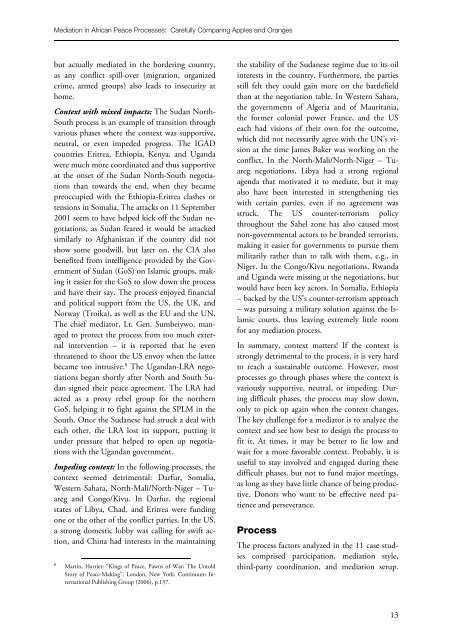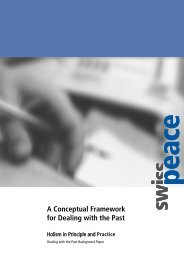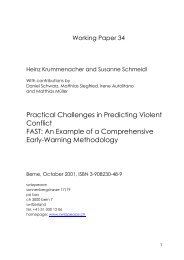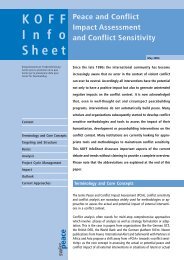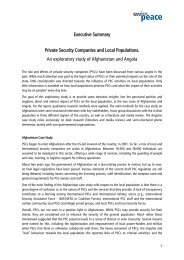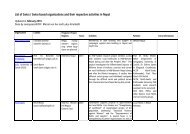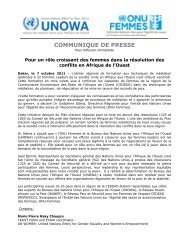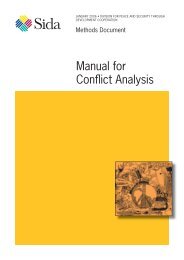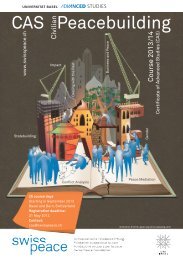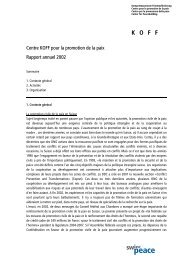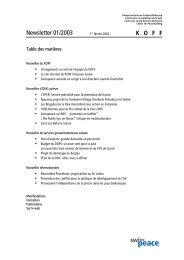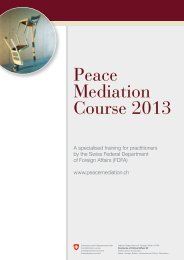Unpacking the Mystery of Mediation in African Peace ... - Swisspeace
Unpacking the Mystery of Mediation in African Peace ... - Swisspeace
Unpacking the Mystery of Mediation in African Peace ... - Swisspeace
Create successful ePaper yourself
Turn your PDF publications into a flip-book with our unique Google optimized e-Paper software.
<strong>Mediation</strong> <strong>in</strong> <strong>African</strong> <strong>Peace</strong> Processes: Carefully Compar<strong>in</strong>g Apples and Oranges<br />
but actually mediated <strong>in</strong> <strong>the</strong> border<strong>in</strong>g country,<br />
as any conflict spill-over (migration, organized<br />
crime, armed groups) also leads to <strong>in</strong>security at<br />
home.<br />
Context with mixed impacts: The Sudan North-<br />
South process is an example <strong>of</strong> transition through<br />
various phases where <strong>the</strong> context was supportive,<br />
neutral, or even impeded progress. The IGAD<br />
countries Eritrea, Ethiopia, Kenya, and Uganda<br />
were much more coord<strong>in</strong>ated and thus supportive<br />
at <strong>the</strong> onset <strong>of</strong> <strong>the</strong> Sudan North-South negotiations<br />
than towards <strong>the</strong> end, when <strong>the</strong>y became<br />
preoccupied with <strong>the</strong> Ethiopia-Eritrea clashes or<br />
tensions <strong>in</strong> Somalia. The attacks on 11 September<br />
2001 seem to have helped kick <strong>of</strong>f <strong>the</strong> Sudan negotiations,<br />
as Sudan feared it would be attacked<br />
similarly to Afghanistan if <strong>the</strong> country did not<br />
show some goodwill, but later on, <strong>the</strong> CIA also<br />
benefited from <strong>in</strong>telligence provided by <strong>the</strong> Government<br />
<strong>of</strong> Sudan (GoS) on Islamic groups, mak<strong>in</strong>g<br />
it easier for <strong>the</strong> GoS to slow down <strong>the</strong> process<br />
and have <strong>the</strong>ir say. The process enjoyed f<strong>in</strong>ancial<br />
and political support from <strong>the</strong> US, <strong>the</strong> UK, and<br />
Norway (Troika), as well as <strong>the</strong> EU and <strong>the</strong> UN.<br />
The chief mediator, Lt. Gen. Sumbeiywo, managed<br />
to protect <strong>the</strong> process from too much external<br />
<strong>in</strong>tervention – it is reported that he even<br />
threatened to shoot <strong>the</strong> US envoy when <strong>the</strong> latter<br />
became too <strong>in</strong>trusive. 8 The Ugandan-LRA negotiations<br />
began shortly after North and South Sudan<br />
signed <strong>the</strong>ir peace agreement. The LRA had<br />
acted as a proxy rebel group for <strong>the</strong> nor<strong>the</strong>rn<br />
GoS, help<strong>in</strong>g it to fight aga<strong>in</strong>st <strong>the</strong> SPLM <strong>in</strong> <strong>the</strong><br />
South. Once <strong>the</strong> Sudanese had struck a deal with<br />
each o<strong>the</strong>r, <strong>the</strong> LRA lost its support, putt<strong>in</strong>g it<br />
under pressure that helped to open up negotiations<br />
with <strong>the</strong> Ugandan government.<br />
Imped<strong>in</strong>g context: In <strong>the</strong> follow<strong>in</strong>g processes, <strong>the</strong><br />
context seemed detrimental: Darfur, Somalia,<br />
Western Sahara, North-Mali/North-Niger – Tuareg<br />
and Congo/Kivu. In Darfur, <strong>the</strong> regional<br />
states <strong>of</strong> Libya, Chad, and Eritrea were fund<strong>in</strong>g<br />
one or <strong>the</strong> o<strong>the</strong>r <strong>of</strong> <strong>the</strong> conflict parties. In <strong>the</strong> US,<br />
a strong domestic lobby was call<strong>in</strong>g for swift action,<br />
and Ch<strong>in</strong>a had <strong>in</strong>terests <strong>in</strong> <strong>the</strong> ma<strong>in</strong>ta<strong>in</strong><strong>in</strong>g<br />
8 Mart<strong>in</strong>, Harriet: “K<strong>in</strong>gs <strong>of</strong> <strong>Peace</strong>, Pawns <strong>of</strong> War: The Untold<br />
Story <strong>of</strong> <strong>Peace</strong>-Mak<strong>in</strong>g”, London, New York: Cont<strong>in</strong>uum International<br />
Publish<strong>in</strong>g Group (2006), p.137.<br />
<strong>the</strong> stability <strong>of</strong> <strong>the</strong> Sudanese regime due to its oil<br />
<strong>in</strong>terests <strong>in</strong> <strong>the</strong> country. Fur<strong>the</strong>rmore, <strong>the</strong> parties<br />
still felt <strong>the</strong>y could ga<strong>in</strong> more on <strong>the</strong> battlefield<br />
than at <strong>the</strong> negotiation table. In Western Sahara,<br />
<strong>the</strong> governments <strong>of</strong> Algeria and <strong>of</strong> Mauritania,<br />
<strong>the</strong> former colonial power France, and <strong>the</strong> US<br />
each had visions <strong>of</strong> <strong>the</strong>ir own for <strong>the</strong> outcome,<br />
which did not necessarily agree with <strong>the</strong> UN’s vision<br />
at <strong>the</strong> time James Baker was work<strong>in</strong>g on <strong>the</strong><br />
conflict. In <strong>the</strong> North-Mali/North-Niger – Tuareg<br />
negotiations, Libya had a strong regional<br />
agenda that motivated it to mediate, but it may<br />
also have been <strong>in</strong>terested <strong>in</strong> streng<strong>the</strong>n<strong>in</strong>g ties<br />
with certa<strong>in</strong> parties, even if no agreement was<br />
struck. The US counter-terrorism policy<br />
throughout <strong>the</strong> Sahel zone has also caused most<br />
non-governmental actors to be branded terrorists,<br />
mak<strong>in</strong>g it easier for governments to pursue <strong>the</strong>m<br />
militarily ra<strong>the</strong>r than to talk with <strong>the</strong>m, e.g., <strong>in</strong><br />
Niger. In <strong>the</strong> Congo/Kivu negotiations, Rwanda<br />
and Uganda were miss<strong>in</strong>g at <strong>the</strong> negotiations, but<br />
would have been key actors. In Somalia, Ethiopia<br />
– backed by <strong>the</strong> US’s counter-terrorism approach<br />
– was pursu<strong>in</strong>g a military solution aga<strong>in</strong>st <strong>the</strong> Islamic<br />
courts, thus leav<strong>in</strong>g extremely little room<br />
for any mediation process.<br />
In summary, context matters! If <strong>the</strong> context is<br />
strongly detrimental to <strong>the</strong> process, it is very hard<br />
to reach a susta<strong>in</strong>able outcome. However, most<br />
processes go through phases where <strong>the</strong> context is<br />
variously supportive, neutral, or imped<strong>in</strong>g. Dur<strong>in</strong>g<br />
difficult phases, <strong>the</strong> process may slow down,<br />
only to pick up aga<strong>in</strong> when <strong>the</strong> context changes.<br />
The key challenge for a mediator is to analyze <strong>the</strong><br />
context and see how best to design <strong>the</strong> process to<br />
fit it. At times, it may be better to lie low and<br />
wait for a more favorable context. Probably, it is<br />
useful to stay <strong>in</strong>volved and engaged dur<strong>in</strong>g <strong>the</strong>se<br />
difficult phases, but not to fund major meet<strong>in</strong>gs,<br />
as long as <strong>the</strong>y have little chance <strong>of</strong> be<strong>in</strong>g productive.<br />
Donors who want to be effective need patience<br />
and perseverance.<br />
Process<br />
The process factors analyzed <strong>in</strong> <strong>the</strong> 11 case studies<br />
comprised participation, mediation style,<br />
third-party coord<strong>in</strong>ation, and mediation setup.<br />
13


